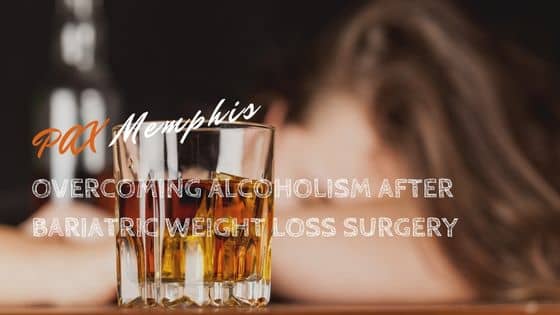For people living with obesity, undergoing weight loss surgery can be a significant step toward a healthier lifestyle. But life after bariatric weight loss surgery is not always easy. For some who have had this life-changing medical procedure, one potential complication is the development of alcoholism and other forms of addiction.
It’s essential to understand the connection between alcoholism and bariatric weight loss surgery so that you can make informed decisions about your medical care and seek the treatment you need.
Understanding Weight Loss Surgery
Obesity–a body weight that exceeds healthy limits–can contribute to many serious, sometimes life-threatening complications. According to the CDC, obesity is linked to the following:[1]
- High blood pressure
- High cholesterol
- Coronary heart disease
- Type 2 diabetes
- Stroke
- Gallbladder disease
- Sleep apnea and other breathing problems
- Osteoarthritis
- Chronic inflammation
- Certain types of cancer
- Body pain and low functioning
- Depression, anxiety, and other mental health disorders
Many people struggle to lose weight, and those who do cannot often maintain the weight loss for a significant period. Weight loss surgery is one way people with obesity can reduce their weight and achieve a healthier body composition.
Weight loss surgery can happen in several methods, including bypass surgery and bariatric sleeve. In weight loss surgeries, doctors alter a person’s digestive tract to reduce its capacity or limit how it absorbs calories and nutrients. People with weight loss surgery cannot physically eat as much food as they did previously, which often results in rapid weight loss.
How Are Alcoholism and Bariatric Weight Loss Surgery Connected?
Bariatric surgery can be a life-saving measure for people needing to lose a significant amount of weight. But some evidence shows weight loss surgery affects the body and mind of people who go under the knife. People who have weight loss surgery are more likely to develop alcoholism and other addictive behaviors.
But why are alcoholism and bariatric weight loss surgery linked? In an extensive study of over 40,000 participants, bariatric weight loss patients were more likely to develop alcohol and other substance abuse in the second year after their surgery. A smaller study of 1,900 patients in recent years reflected these results. Of those who developed alcoholism after weight loss surgery, over 60% had never had problems with excessive alcohol use in the past.[2]
Researchers believe people may transfer a food addiction to a new addictive behavior, including gambling, sex, drugs, and alcohol. Eating food can cause a flood of dopamine–the neurotransmitter involved in pleasure and reward–that can eventually lead to addictive behaviors around eating. Behavioral experts believe people may become dependent on the dopamine rush they get from eating in the same way others develop an addiction to drugs or alcohol.
Since bariatric weight loss surgery reduces the physical capacity to eat, people cannot meet the demands of their food addiction. They may transfer their food addiction after weight loss surgery to alcohol.
What Are the Risk Factors for Developing Alcoholism After Gastric Bypass?
When people with food addiction can no longer eat in the same way after weight loss surgery, they may transfer their addictive behaviors to a new outlet. Alcohol is an accessible, affordable, socially-acceptable drug that can increase dopamine production, making it a common replacement for people after weight loss surgery.
Several factors make it more likely that someone will transfer addiction after weight loss surgery. These factors include:
- Being male
- Younger age
- History of drinking regularly
- Smoking
- Lacking social support
Weight loss surgery can lead to hormonal and metabolic changes in a person’s body, making them more sensitive to the effects of alcohol. These changes may also increase a person’s vulnerability to alcoholism.
Regardless of risk factors, people who have had bariatric weight loss surgery are more likely to develop alcoholism and other addiction in the first few years after the procedure than the general population. It’s essential to recognize the signs of addiction and seek treatment for a transfer addiction after weight loss surgery.
What Happens in Treatment for Alcoholism and Gastric Bypass?
Treatment for alcoholism and gastric bypass surgery happens in stages, beginning with an evaluation by a doctor or addiction specialist. Your treatment team needs to understand your unique needs and goals so they can design a program that will provide the best, safest outcomes.
Many people begin treatment in a medically-supported detox program where they can be monitored and treated for withdrawal symptoms. Having this support can greatly increase a person’s odds of having a safe, comfortable, complete detox.
After a successful detox, you can begin a comprehensive treatment program that will address alcoholism’s biological, emotional, and behavioral aspects. Programs generally include evidence-based and holistic therapies, including:
- Individual alcohol addiction counseling
- Group therapy
- Nutritional counseling
- Family therapy, if appropriate
- Education
- Medications
- Mental health treatment
- Holistic therapies like massage, mindfulness, yoga, acupuncture, and art therapy
In treatment for alcoholism and gastric bypass, therapies and medical care are offered by practitioners with extensive experience treating people who’ve had weight loss surgery. Plans may include guidance from nutritionists with expertise treating bariatric weight loss patients and support from specialists and holistic practitioners who support whole-self healing in recovery.
A comprehensive alcoholism treatment plan will include treatment, support, and skills practice that allows you to develop new, healthy habits. By learning new routines and attending to your physical and emotional needs in treatment, you will learn how to maintain your health and avoid relapse for life.
Find Help Now
If you want to learn more about the link between alcoholism and gastric bypass or about starting one of our comprehensive treatment plans, reach out to the PAX Memphis specialists today.
References:
Medically Reviewed: September 25, 2019

All of the information on this page has been reviewed and verified by a certified addiction professional.










